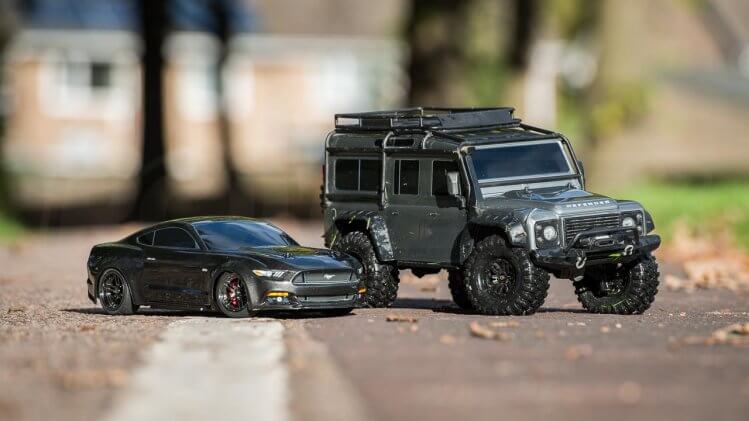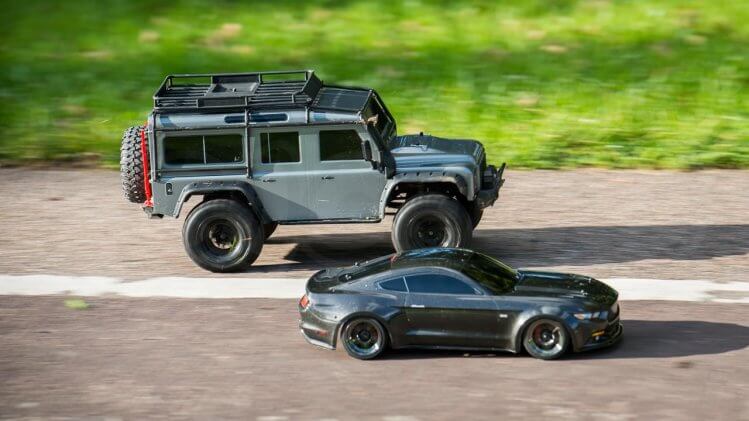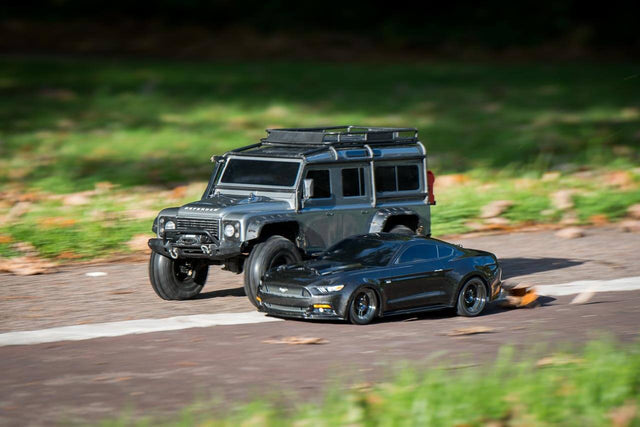Here at RC Geeks, we're often asked how fast a specific car will go and, unfortunately, we often have to avoid exact answers. However, we've made this convenient little blog to help you understand the variables which will contribute to an RC cars top speed, and hopefully give you some idea how fast your RC car can go.





Brushed vs Brushless
The first variable to tackle has to be brushed vs brushless motors. But, Rory, what's the difference? I hear you ask. Well it's the brushes, of course. The general workings of brushed and brushless motors are essentially the same; however, brushed motors use friction to apply charge to the motor, which allows less of the raw power to be converted to actual rotation. Brushless motors, on the other hand, are generally around 10-15% more efficient, due to the reduction in energy being lost as heat and noise. So if it's speed you're after, it's got to be brushless.
How do I find out if an RC car is brushed or brushless?
Generally, a quick search of the car in question will bring up the manufacturers page - containing every possible detail of the car, right down to the name of the person who painted it. Well, maybe not quite that far, but you get my point. Luckily for you, RC Geeks have sifted through all of the useless information for you already. Simply visit the cars section of our website, or use our search bar to locate the car that you're looking for. Scroll down on its page and expand the "Specification" box, as seen below. Under "Power", you'll either see "Brushed" or "Brushless" simple, right? We often also include handy information such as scale size and surface type in this section, you're welcome.
LiPo vs NiMH
The next clear progression in our quest for speed has to be LiPo vs NiMH batteries. So, lets start with Nickel Metal Hydrate batteries (yes, I Googled what they stand for). NiMH batteries typically have a lower efficiency and a lower energy density than LiPo batteries. Although they are generally considered to be safer and easier to maintain - if speed is what you're after - LiPo all the way. Lithium Polymer batteries have a higher discharge rate, and a larger energy density, meaning that they can channel more power at any one time and, therefore, increase the power being supplied to the motors. Some of our cars are even both NiMH and LiPo compatible. This can be useful for the newbies among us, as the slightly more docile NiMH battery can be used initially, during the learning phase, and the LiPo upgraded to at a later stage.
So, How Fast Will My Car Go?
I guess this is the bit you've all be waiting for, ehh? Now it's all very well us throwing neon-trimmed info-graphics at you, in the hope to impress you - but don't worry, I'll also be highlighting exactly what you need to be focusing on. The table below is an official speed chart from Traxxas - specifically for the Traxxas Slash 4x4. The first variable that we're going to compare is battery type - specifically 8.4V NiMH with 3S LiPo. To do this, we'll be using the green and orange columns, where the pinion gears are still in stock gearing. We can see a shift from 35+ mph to 45+ mph, meaning a rough increase of 10 mph in top speed, and a skill level jump from 1 to 4, meaning a huge jump in acceleration. Acceleration is a whole other ball game, that would require a whole other blog, but we can confidently say that due to the higher energy density of LiPo batteries that we spoke about earlier - we can be sure that LiPo batteries will almost always provide a more than noticeable increase in acceleration than NiMH batteries will. The other two columns to compare are the yellow and red ones. The pinion gears in these columns are not at stock settings, however; they are both using the same gearing (19/54) so this is still a fair comparison. We can see a speed jump of roughly 20 mph and an increase of skill level from 4 to 5. From these comparisons we can clearly see how an upgrade from NiMH to LiPo will slightly increase top speed, and hugely increase acceleration, whilst an upgrade from 2S LiPo to 3S LiPo will provide a slight increase in acceleration and a huge increase in top speed.
Always Check That Your Car Is Compatible
Always check that your car is compatible with the type of battery and the voltage of battery that you wish to use. If you're not sure how to find this, the manufacturers website will have all of the information you need, or you can get in touch with one of our friendly team.What If I Want Even More Speed?
Please note that these are guidelines, and there are still many factors that we haven't mentioned that can affect the speed of your car. For example Traxxas include Pinion gear sizes - which do make a huge affect to the speed of your car. Whereas we have focused on the more "out of the box" configurations in this blog, to help you work out a rough speed before you even have to buy the car. However, don't fear, even if you're not happy with the speed of your current car, it's not all doom and gloom. You can check out our wide range of pinion gears here, or if you're interested in tinkering, or would like to get in to it, check out our blog on the brushless conversion of our Traxxas Land Rover TRX-4.Don't Overestimate the Speed You'll Need
When it comes to selecting an RC car speed, it's not just about the most expensive you can, you need to take in to account whether or not you'll be able to utilise all of the cars speed. If you don't have much space around you, and you don't want to take your car to a park, there's no use in having a 60 mph car that will only ever get to go 30. Similarly, if you're a complete newbie, don't jump in at the deep end - you'll regret it. Pick up a smaller, slower model before progressing to the mighty likes of the X-Maxx and the XO-1. Cars such as the 6mph Ultimate Lightning McQueen are tremendous fun, regardless of their speed. If you want to know why, here's a shameless plug - check out my Sphero Ultimate Lightning McQueen Hands-On Review!
